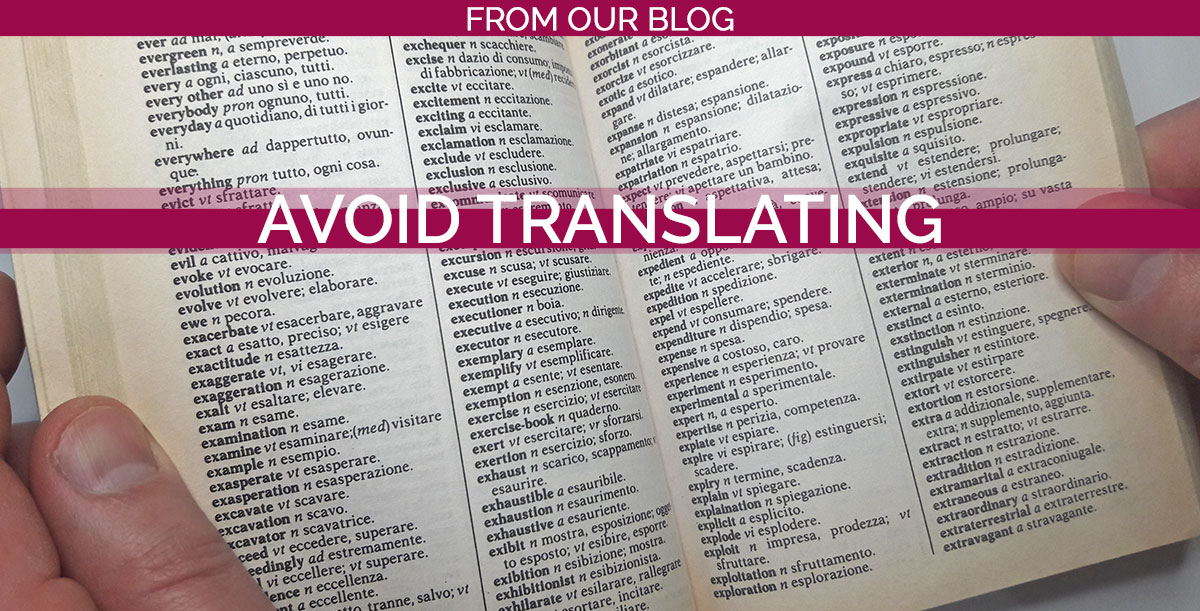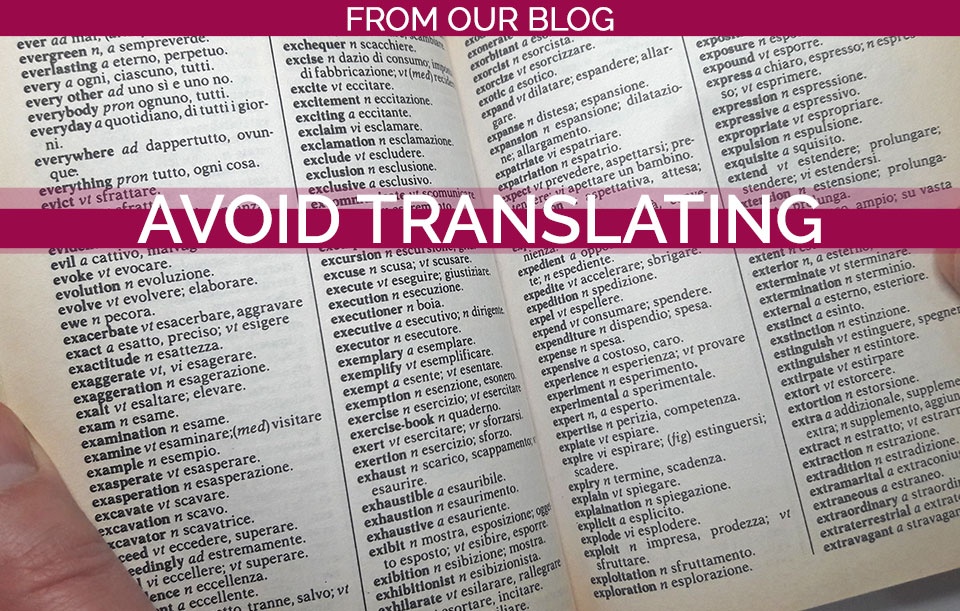
How to improve your listening skills
10/11/2020
Avoid translating
20/02/2021M
uch like other European languages, English borrows words from Latin and Ancient Greek, and worldwide, English is spoken by 1.1 billion people. Counting both native and non-native speakers, this makes English the most spoken language in the world. Yet despite its popularity as the most common second language for foreign speakers, English has gained a reputation for being incredibly difficult to learn - and even harder to master. So, why is this?
The English language is full of contradictions that most native speakers are unaware of, and so it doesn’t help that we Brits struggle to understand our own language as much as someone who is learning it. As English is so popular amongst foreign speakers, Brits tend to be lazy when it comes to learning other languages. Only 38% of Britons can speak a foreign language, and most of us find it difficult to explain the grammatical rules of English.
This blog series will aim to help those learning English by explaining the conversational quirks and nuances that are overlooked by native speakers. By touching on topics such as dialect, accents, idioms and slang, we can try to understand why English is so difficult to learn!
The English language is full of contradictions that most native speakers are unaware of, and so it doesn’t help that we Brits struggle to understand our own language as much as someone who is learning it. As English is so popular amongst foreign speakers, Brits tend to be lazy when it comes to learning other languages. Only 38% of Britons can speak a foreign language, and most of us find it difficult to explain the grammatical rules of English.
This blog series will aim to help those learning English by explaining the conversational quirks and nuances that are overlooked by native speakers. By touching on topics such as dialect, accents, idioms and slang, we can try to understand why English is so difficult to learn!
Know the rules!

M
astering syntax in conversation is key for those learning English, as this aspect of language can differentiate foreign speakers from native speakers.
Native English speakers intuitively know what order to put words but this is something which is difficult to teach. Unfortunately, this means that when you ask a native speaker why it is correct to say: ‘brown leather walking boots’ and not ‘leather walking brown boots’, they will usually tell you that it just sounds right.
Syntax in the French language is relatively straightforward. As a general rule, attributive adjectives go after the noun they are describing.
In English, adjectives always go before the noun.
• The round table = la table ronde
• The black cat = le chat noir
Native English speakers intuitively know what order to put words but this is something which is difficult to teach. Unfortunately, this means that when you ask a native speaker why it is correct to say: ‘brown leather walking boots’ and not ‘leather walking brown boots’, they will usually tell you that it just sounds right.
Syntax in the French language is relatively straightforward. As a general rule, attributive adjectives go after the noun they are describing.
In English, adjectives always go before the noun.
• The round table = la table ronde
• The black cat = le chat noir
There is one exception to this rule however, which is relatively easy for non-native speakers to grasp. When learning French word order, we are taught to use the acronym ‘BAGS’ to recognise adjectives which always precede a noun. This stands for Beauty, Age, Goodness, Size:
• The pretty girl = la jolie fille
• The young boy = le jeune garçon
• The good fairy = la bonne fée
• The little rabbit = le petit lapin
• The young boy = le jeune garçon
• The good fairy = la bonne fée
• The little rabbit = le petit lapin
I
n French, like in English, you can use multiple adjectives to describe a noun, and the rule for the syntax is simple. If one of the adjectives follows the noun and the other is a ‘BAGS’ adjective, which precedes the noun, then the word order follows the usual pattern:
• A beautiful red dress = une belle robe rouge
If both adjectives come after the noun, they are simply joined with ‘et’ (and):
• A fast blue car = une voiture rapide et bleue
The rule of objectivity

B
ut the rule for word order in English is not so explicit as it is in French, and even once a learner grasps English syntax, there are of course many contradictions to the rule that simply have to be memorised.
As the adjective in the attributive position always precedes the noun in English, the difficulty with syntax arises when determining the order of the adjectives if more than one is being used. For foreign learners, this becomes even more difficult as it is perfectly normal for native English speakers to use multiple adjectives at once - something which isn’t so common in French or other European languages.
As the adjective in the attributive position always precedes the noun in English, the difficulty with syntax arises when determining the order of the adjectives if more than one is being used. For foreign learners, this becomes even more difficult as it is perfectly normal for native English speakers to use multiple adjectives at once - something which isn’t so common in French or other European languages.
Those learning English as a second language are taught that adjectives are ordered according to their objectivity in relation to the noun which they are describing: the more subjective the adjective is, the further it should be placed from the noun, and the more objective, the closer it should be. However, this is a vague method for learning word order and it can create confusion for those learning English.
In English, the law which determines the word order of adjectives is virtually unbreakable, even in informal conversation - yet most native speakers don’t even know it exists. You simply can’t say ‘leather walking brown boots’ or ‘old silly fool.’ A native English speaker will tell you that it’s ‘brown leather walking boots’ and ‘silly old fool,’ but it’s unlikely that they will be able to explain why…
Adjectives in English must always follow this order: opinion, size, age, shape, colour, origin, material, purpose. So you can have a beautiful little old rectangular yellow French wooden rocking chair, but if you change the word order even the slightest, it will sound nonsensical.
In English, the law which determines the word order of adjectives is virtually unbreakable, even in informal conversation - yet most native speakers don’t even know it exists. You simply can’t say ‘leather walking brown boots’ or ‘old silly fool.’ A native English speaker will tell you that it’s ‘brown leather walking boots’ and ‘silly old fool,’ but it’s unlikely that they will be able to explain why…
Adjectives in English must always follow this order: opinion, size, age, shape, colour, origin, material, purpose. So you can have a beautiful little old rectangular yellow French wooden rocking chair, but if you change the word order even the slightest, it will sound nonsensical.

The order of adjectives in English follows this rule
S
o if you’re a native speaker, you already obey this complicated and seemingly unnecessary grammar rule without even realising. But if English is your second language, then this syntax rule is just something that you will have to master.
This blog post has been written in English by Melissa Hanson and is also available in French and Italian. Click on the flag on the top right to change the language.
Melissa Hanson is an English native speaker, also fluent in French. She has just graduated in MA in Global Politics and Political Affairs from the University of Liège in Belgium and in 2019 she graduated from the University of Leeds in the UK with a Bachelors in International Development.
Studying her Masters in the Wallonia of Belgium helped her to improve her French speaking skills and she hopes to live abroad again with the goal of one day being able to speak French to a native level.
Studying her Masters in the Wallonia of Belgium helped her to improve her French speaking skills and she hopes to live abroad again with the goal of one day being able to speak French to a native level.









